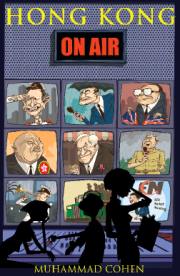
Believable 1997 Farce
for Hong Kong Handover Nostalgia Fans
A review of
Hong Kong on Air
by Muhammad Cohen
Blacksmith Books

The mishaps, betrayals, coincidences and other twists and turns add up to an often-raucous comedy of errors, including much of good, laugh-out-loud standard. There is no moral to draw or sympathy to spare. None of the cast of not-very-likeable characters encounters a misfortune they don’t deserve. And for all their greed and self-centredness, the reader doesn’t resent anyone their success and luck either. Asia’s economic boom is on overdrive; then the crash comes. Winners and losers are chosen almost at random.
This is the novel’s strength: the author (a TV newsman in Hong Kong at the time) captures the hubristic and opportunistic mood of the era and the shock of the reality that followed. The newsroom is a microcosm of a society discarding colonialism and not sure what is coming next. Junior, apparently unqualified, Asian faces rise up the ladder, suddenly wielding newly important connections and abilities. Supposedly seasoned Westerners are sidelined, swallow their pride and push the right buttons behind the scenes.
Readers who feel the story goes beyond satire probably weren’t in Hong Kong at the time. Women’s undergarments as a business was nothing: this reviewer knew a young American man whose career revolved around Barbie Dolls. The description of life in a pricy, wretchedly tiny apartment is, if anything, understated. One scene – a flowing narrative of the TV station’s embarrassingly over-the-top promotional video, where the anchor keeps cropping up in exotic locations spouting inanities about the Asian Century – is hilarious because it hits the pre-Financial Crisis delusions right on the head.
Indeed, although the small print at the beginning of the book says this is a work of fiction, parts of the story bring back specific memories at least to this reviewer and apparently to a couple of the novel’s admirers quoted on the back cover. There really were Western-raised ethnic Asian media personalities like Laura’s newsreader Deng Jiang Mao, who became born-again Orientals for career purposes. There really was one incident (that I knew of) when a head honcho from New York swooped in to a major media organisation like Laura’s and fired the top people on the spot. And – eerily – there really was a rather promiscuous female investment banker of the sort that befriends Jeff living in the tower block that has an entrance on the Mid-Levels Escalator walkway over Robinson Road. (That I, um, knew of. Different floor, though.)
This is the author’s first novel. The characters are incompletely sketched, leaving the reader short of clues about their eventual behaviour, which seems erratic as a result. The non-native speakers’ Chinglish speech patterns don’t cut it. And, for the nitpicking, a minor character’s name changes from Zao to Zhao. But the dialogue is often side-splitting, the Hong Kong clichés mercifully few, and the plot rich. For those of us who were there, the mood is guaranteed to trigger nostalgic flashbacks, and possibly the uneasy feeling that we will turn the page and see someone we know.